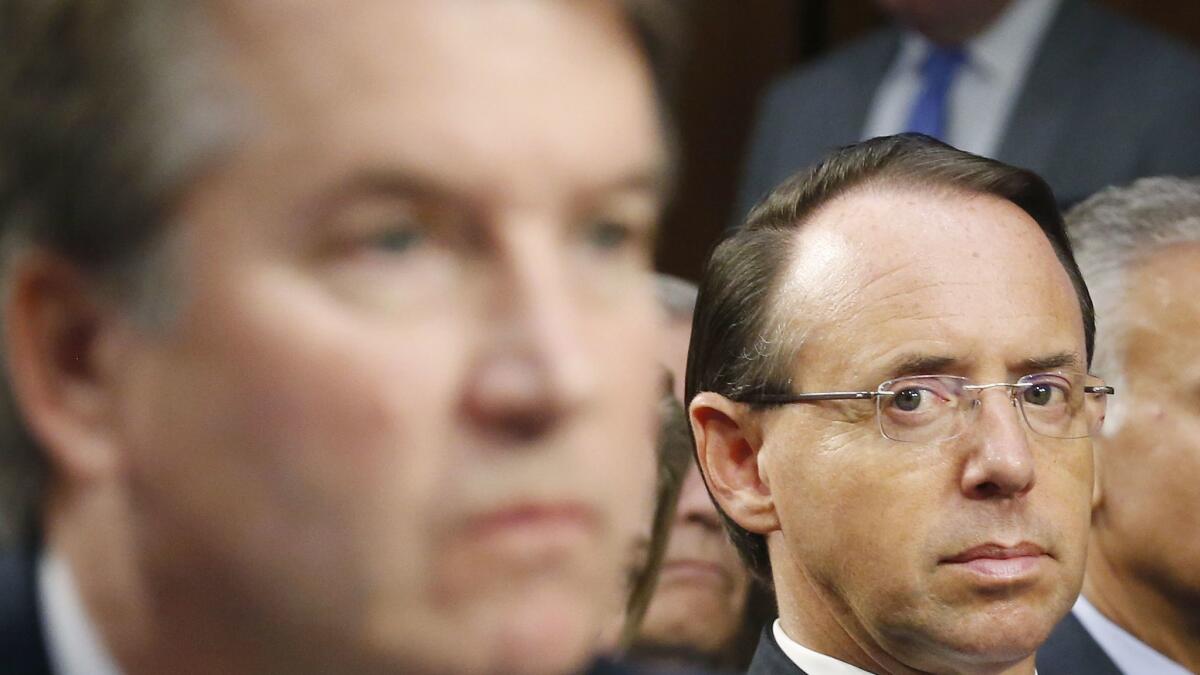Brett Kavanaugh and Rod Rosenstein both learned to ‘tune out the noise’ while investigating President Clinton. Now they’re at the center of it

Reporting from Washington — Ken Starr had firm criteria when hiring lawyers for his independent counsel investigation of President Clinton: The attorneys had to be smart, possess sterling credentials and be willing to log long hours.
Another important skill, he said in a recent interview, was harder to assess, but revealed itself as pressure mounted — an ability to tune out the noise.
Few federal inquiries have generated as much controversy and press attention as the one Starr ran, which ultimately led to Clinton’s impeachment on charges of lying about his affair with Monica Lewinsky.
The experience served as a launching pad for the careers of many ambitious, young conservative lawyers who now, 20 years later, can be found sprinkled through senior positions in Washington.
Thursday, two of Starr’s most prominent proteges are set to have their focus and determination tested almost simultaneously in a cacophonous crucible that resounds with many of the same conflicts from that tumultuous period.
Brett Kavanaugh will seek to salvage his nomination to the U.S. Supreme Court in testimony that will delve into sexual assault allegations dating back to high school.
Rod Rosenstein is scheduled to meet with President Trump to discuss his future as the Justice Department’s second-in-command following a tense and tumultuous week that nearly saw him resign, or be fired. The fate of special counsel Robert S. Mueller III and his investigation into Russian interference in the 2016 election could hang in the balance.
At a news conference on Wednesday, however, Trump said he might postpone the Rosenstein meeting so he could watch Kavanaugh’s hearing.
Colleagues and associates said that the lessons Kavanaugh and Rosenstein learned can be seen as they grapple with the modern media world’s intense spotlight and a hyper-partisan atmosphere that make the 1990s seem slow-paced in comparison.
“One of the things I learned” from working with Starr, Rosenstein said in a recent interview in his fourth-floor office at the Justice Department, “was that when you are assigned a difficult job, you keep your head down and do the job. In a high-profile case, you are going to be criticized and you are not going to make everyone happy. You have to do the right thing and in the right way.”
So far, keeping his head down — at least most of the time — has seemed to serve Rosenstein well as he oversees Mueller’s investigation. But he has, nonetheless, come under intense fire from Trump allies for months.
The president, echoing criticism of the Starr inquiry by the Clinton White House, has repeatedly called the Mueller investigation “a witch hunt.”
Rosenstein’s position became more tenuous last week when the New York Times reported that the deputy attorney general last year had suggested wearing a hidden device to record Trump in the Oval Office and had contemplated invoking the 25th Amendment to remove him from office.
The deputy attorney general said the report was inaccurate, but talked with administration officials about possibly resigning, according to people familiar with the matter. He was summoned to the White House early Monday, expecting to be fired, but spoke to Trump and was granted a reprieve until Thursday. Associates expect him to continue in the job at least through the midterm election.
“My preference would be to keep him, and to let him finish up,” Trump said Wednesday when asked about Rosenstein, adding once again that the investigation “is a witch hunt.”
Kavanaugh and Rosenstein held very different jobs during their tenure with Starr, but faced many of the same pressures.
A graduate of Yale Law School, Kavanaugh was a top Starr deputy who spent his early time on the independent counsel team reinvestigating the suicide of White House lawyer Vince Foster. Some conservative members of Congress had pushed the theory that Foster had been killed to prevent him from disclosing sensitive information about Bill or Hillary Clinton.
Kavanaugh briefly left Starr’s staff in 1997 before returning to help craft the office’s final report. In memos, the lawyer advocated that President Clinton should be forced from office for “his pattern of revolting behavior” and pushed prosecutors to aggressively and explicitly question the president about his sexual activity.
In one of the twists of history, the 53-year-old Kavanaugh now faces the prospect of answering similarly explicit questions about his own history in a televised Senate hearing. A California professor, Christine Blasey Ford, has accused him of sexually assaulting during a party when they were both teenagers. Two other women have leveled other accusations of sexual misconduct. He has denied the allegations.
After leaving the counsel’s office, he worked closely with President George W. Bush in the White House and was confirmed in 2006 to be a federal appeals court judge in Washington, where he has gained a reputation for being a consistently conservative jurist.
Though he worked for Starr, Kavanaugh has expressed skepticism about the validity of such inquiries since the 1990s. In legal journals, he has argued that special investigations of the president are a mistake and probably unconstitutional.
His views on the subject were a focus in confirmation hearings this month before the Senate Judiciary Committee, where Democrats suggested that Kavanaugh’s change of heart was politically convenient now that a Republican was in the White House. They expressed concern that if he were confirmed to the Supreme Court, challenges to Mueller’s authority could end up before Kavanaugh.
Rosenstein played a smaller role in the Starr’s office. A Harvard Law graduate and public corruption prosecutor before joining the independent counsel’s staff, he thrived in the courtroom.
He played a supporting role in the successful prosecution of three onetime associates of the Clintons — Susan McDougal, James McDougal and former Arkansas Gov. Jim Guy Tucker. They were convicted in 1996 on charges related to a $3-million conspiracy to defraud two federally backed financial institutions stemming from an Arkansas real estate development known as Whitewater.
Rosenstein also helped investigate whether the Clintons played a role in improperly obtaining FBI background files on Republicans. He interviewed Hillary Clinton about the case in January 1998; the independent counsel ultimately concluded no crime had been committed.
He went on to become a federal prosecutor and enjoyed a 12-year stint as U.S. attorney in Maryland, being appointed to that post by Bush and by President Obama. He was then tapped by Trump to become deputy attorney general.
When Atty. Gen. Jeff Sessions recused himself from the Russia investigation, Rosenstein took over supervising the inquiry. He named Mueller as a special counsel to take over the investigation shortly after Trump abruptly fired FBI Director James B. Comey in May 2017.
Rosenstein has been attacked by Trump’s allies for his handling of the case. Over the summer, 11 House Republicans introduced articles of impeachment to start the process of removing him from office.
Friends and former colleagues say Rosenstein’s supervision of Mueller’s investigation has been informed by what he observed while working for Starr. The independent counsel began with a mandate to investigate the Whitewater land deal, but the inquiry eventually sprawled into matters far afield from that, ending with the accusations about Clinton’s sexual conduct that led to the impeachment.
Throughout Mueller’s investigation, Rosenstein has sought to keep it focused on its original mandate — to investigate Russia’s meddling in the presidential election and potential links between Moscow and Trump associates.
Mueller has referred other matters to federal prosecutors in other offices, including charges related to Michael Cohen, Trump’s former personal attorney. Cohen pleaded guilty to charges brought by federal prosecutors in New York that stemmed from the payment of hush money to two women who alleged they had affairs with Trump.
Starr said in an interview that he was impressed by how Rosenstein and Kavanaugh have handled pressures that reminded him of those his office faced.
“I tried to have an eye for great talent and great character, and these two met that criteria,” he said during an interview as he toured to promote his newly published memoir, “Contempt.”
“Both were also determined to do the job and focus on it, and to seal out the distractions and to be disciplined even in the face of relentless attacks. ... They are doing that today.”
Times researchers Cary Schneider and Scott Wilson contributed to this report.
UPDATES:
3:00 p.m.: This article was updated with President Trump’s comments about Rosenstein at his news conference.
This article was originally published at 12:50 p.m.
More to Read
Get the L.A. Times Politics newsletter
Deeply reported insights into legislation, politics and policy from Sacramento, Washington and beyond. In your inbox three times per week.
You may occasionally receive promotional content from the Los Angeles Times.











